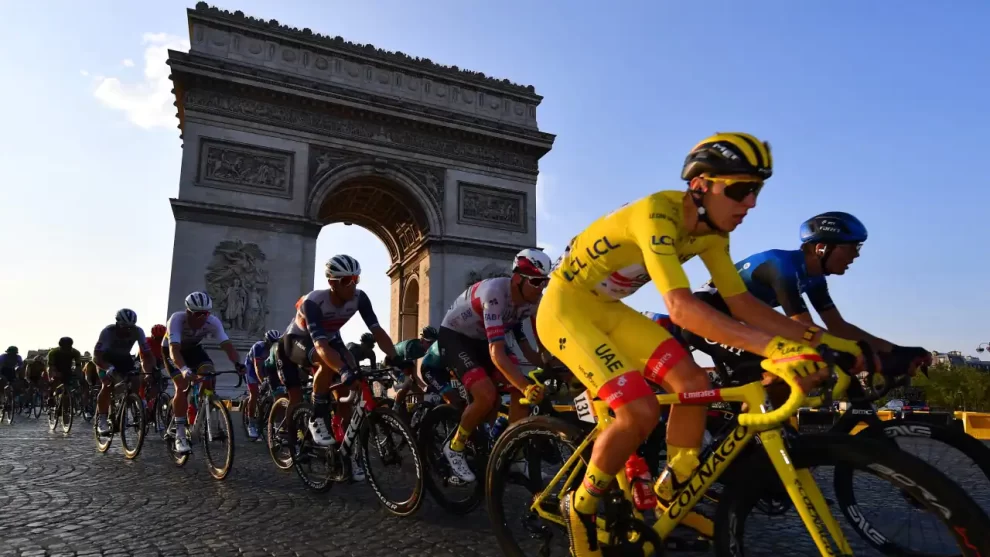Netflix’s new documentary series Tour de France: Unchained has been an excellent appetiser. Now comes the main course, as the world’s biggest cycling race gets under way on July 1.
With the second instalment of the women’s race, Tour de France Femmes, starting on the day the men’s race finishes in Paris, SBS will have coverage until July 30. That’s just shy of a whole month of late nights and early morning catch-ups for cycling fans.
Bridie O’Donnell, who will join fellow commentators Matthew Keenan and Simon Gerrans on an epic road trip to cover the two races, believes the emotion and insights in Unchained will only bring more viewers to SBS.
The former doctor and professional cyclist thinks it will do what Formula 1: Drive To Survive, from the same producers, did: open up the sport to people who haven’t previously understood how it works, including the team tactics, the personalities of riders, their commitment, how they approach each stage and what’s at stake.
“What was also fantastic was just understanding how much brutality and risk is involved in professional cycling,” O’Donnell says. “We saw the damage that occurs when a rider crashes at high speed.”
High-speed crashes, frantic finishes, spectacular landscapes and daily drama are guaranteed as the two young winners of the last three Tours, Slovenia’s Tadej Pogacar and Denmark’s Jonas Vingegaard, take on the world’s best riders, including Australian yellow jersey hopes Jai Hindley and Ben O’Connor.
The 21 stages cover more than 3400 kilometres over five mountain ranges. It will be a race that suits strong climbers, with eight flat, four hilly and eight mountain stages, plus a short-but-steep individual time trial.
“The first three stages will be up in the north of Spain – in Bilbao and San Sebastian – so a very beautiful part of the world and [one] that is extremely passionate about cycling,” O’Donnell says. “So the atmosphere will rival what we saw in Copenhagen a year ago.”
O’Donnell describes the 35 days travelling around France to cover the two races last year as “the most exciting road trip I’ve done in many years”.
After the surprise departures of Mike Tomalaris and Robbie McEwen in the past two years, the SBS Tour team includes O’Donnell, Keenan and Gerrans, a four-time Tour stage winner, commentating; former professional riders David McKenzie and Gracie Elvin joined by podcast host Christophe Mallet on the course; Mark Renshaw, a veteran of 10 Tours who retired in 2019, providing analysis from the Sydney studio; and chef Guillaume Brahimi tantalising tastebuds with Plat du Tour.
The three main commentators will take turns driving a van to a new hotel every race day.
“There’s certainly plenty of time for us to understand each other’s music tastes,” O’Donnell says. “We basically make our way each day to the finish line of every stage.
“Once we get there, we settle in to where our commentary position is, do a bit of a reconnoitre of the finish line, check the weather, check the conditions, then we prepare to commentate.”
Happily, there are some great hotels en route even if, like the riders, the commentators have new beds, bathroom facilities and breakfast buffets every day.
“Some days you get to a hotel that’s on the side of a highway that’s perfectly serviceable and simple and close to where you need to get out from the next morning,” O’Donnell says. “Other times your hotel is at the top of a mountain because that’s close to the finish line. And it’s a bit rustic but it has incredible views with an amazing atmosphere.
“Occasionally, you get a really beautiful hotel, and you think, ‘Oh gosh, if only we were staying here for a few days’.”
Their workload is nothing compared to the riders’ but the commentary trio will try to exercise, sleep as much as possible and eat healthily.
“Simon brings a bike so that he can do some recon of the final 10 or 15 kilometres of each stage and film it, which is usually really useful for the viewers on SBS so they get a sense of the finish of a climb or a sprint,” O’Donnell says. “He tries to get a short ride in each day.
“And Matt and I will either walk or run or do some calisthenics in our hotel rooms each morning. I think exercise makes a huge difference when you’re spending a lot of time sitting down either in the commentary booth or in the vehicle after the stage.
“We’re also really fortunate that people who work on the Tour de France have an option to eat lunch at a marquee that’s built every single day near the media zone, and they’ve got delicious and healthy food, all French of course.”
Renshaw, who is best known to Tour fans as lead-out rider for champion British sprinter Mark Cavendish, will analyse stage finishes. He expects it will be emotional if Cavendish, who has equalled Belgian legend Eddy Merckx’s record 34 stage wins, breaks it at his final Tour.
“There’s a pretty good chance he could nab one late in the Tour and that would make for a fairytale end,” he says. Australian fans will hope sprinter Caleb Ewan can get back to his best form.
Renshaw thinks the Tour will be a battle again between two exceptional riders: Pogacar, who has two wins and a second from three Tours at the age of 24; and Vingegaard, who has gone from second to first in two Tours at 26.
“I think it will be a ding-dong battle between them,” he says. “And it wouldn’t surprise me to see one of the second-tier riders try to seize an opportunity by making a bit of commotion in the race.”
O’Donnell agrees the battle between Pogacar and Vingegaard is the compelling storyline but is keen to see who else will push to get on the podium and whether Australian Michael Matthews – “a guaranteed stage winner” – will get a start for Team Jayco Alula.
On the women’s race, Renshaw believes it will keep getting stronger, with the Australian hopes this year including Grace Brown and Amanda Spratt.
“Coming off the back of the men’s race, I think the women’s race will be just as exciting for Australians,” he says. “You see a more aggressive, attacking race because they don’t have so many hours in the saddle.”
O’Donnell, who adds Brodie Chapman to the Australian chances, expects to see bigger audiences for the women’s race both on the side of the road and on SBS.
“I think we’re going to see much narrower finishes,” she says. “You can’t go past Demi Vollering, the young Dutch woman from SD Worx who has won nearly everything this season. That team is very likely to dominate quite a few stages but what we’re going to see, I think, is a greater spread of stage wins.”
The SBS coverage of the Tour de France runs from July 1-23 and Tour de France Femmes from July 23-30.
FIVE STAGES WORTH STAYING UP (LATE) FOR
TOUR DE FRANCE
Stage 1 on July 1
Bilbao to Bilbao (182kms)
With the Grand Depart sure to attract big crowds, this hilly Spanish loop is described as a brutal start to the Tour.
Stage 9 on July 9
Saint-Leonard-de-Noblat to Puy de Dome (182.4kms)
A high-altitude finish up a mythical volcano that will have no spectators for the final (steep and narrow) four kilometres.
Stage 17 on July 19
Saint-Gervais Mont-Blanc to Courchevel (165.7kms)
A monster stage with 5405 metres of climbing, including a 24 per cent climb in sections up Col de la Loze.
Stage 20 on July 22
Belfort to Le Markstein Fellering (133.5kms)
If the yellow jersey is still up for grabs, it will be decided on this testing mountain stage that race director Christian Prudhomme calls “a minefield”.
TOUR DE FRANCE FEMMES
Stage 7 on July 29
Lannemezan to Tourmalet/Bagneres-de-Bigorre (89.8kms)
The women’s peloton will tackle one of cycling’s mythical climbs, the Col du Tourmalet, via the steepest flank.
Source: SMH News































